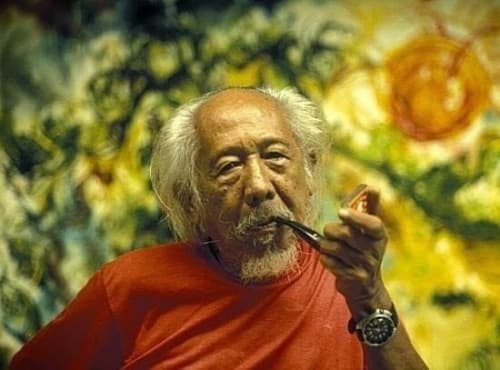Strongly resistant to idealistic portrayals of the Mooi Indies, Affandi (1907 – 1990) is renowned for his commitment to honest expression. Rather than advocating a particular social ideology, he constantly challenged himself to depict the candid, everyday life of Indonesian people. This dedication was in line with his co-founding of Sanggar Pelukis Rakyat (People’s Painter Studio) in 1947, which encouraged members to pursue their ideas of authenticity in artmaking. With his unguarded style and bold subject matter, the Cirebon-born artist was one of Indonesia’s leading expressionist painters in the mid-20th century.
A manifestation of energetic lines and loose brushwork, Affandi’s artistic manner is recognised for its expressive tension. With techniques such as applying paint directly from the tube, his spontaneous and curvilinear markings culminated in a fiercely dynamic sense of movement. The artist painted with immediacy and often completed an entire work in one sitting. Utilising a non-naturalistic colour palette, he illustrated a variety of Indonesian subjects such as fishing boats, dogs, markets, Balinese dancers and more.
Affandi travelled significantly throughout his artistic career. Having received a grant from the Indian government, he went to India and painted there from 1949 to 1951. Thereafter, he journeyed to Europe and exhibited his work at major cities such as Paris, London, Rome and Brussels. Many organisations also acknowledged his influence in the art world. Apart from being appointed as an Honorary Professor in Painting by Ohio State University in Columbus, he also received an honorary doctorate from the National University of Singapore in 1974 and the International Peace Award from the Dag Hammarskjöld Foundation in 1977.
